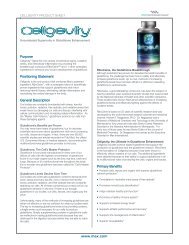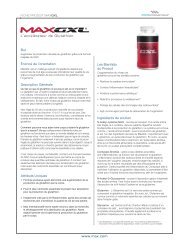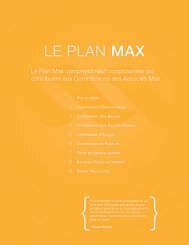Founders Message - Max International Virtual Office
Founders Message - Max International Virtual Office
Founders Message - Max International Virtual Office
You also want an ePaper? Increase the reach of your titles
YUMPU automatically turns print PDFs into web optimized ePapers that Google loves.
product information<br />
page 5<br />
damaging free radicals. Perhaps not so well<br />
known is the danger that second-hand smoke<br />
presents in generating those same dangerous<br />
free radicals.<br />
Glutathione is the body’s most powerful<br />
antioxidant. Recent research showed ways<br />
that smoking compromises the body’s immune<br />
system. Cigarette smoke slowed down<br />
production of immune system cells called<br />
cytokines and reduced the activation of the<br />
molecule nuclear factor-kappa beta (NFkB)<br />
which detects free radicals and infectious<br />
agents. Treatment with glutathione, reported<br />
the study, “reversed both these effects” of<br />
cigarette smoking. 8<br />
Chemicals in Food<br />
A special mechanism is triggered in the<br />
digestive tract when xenobiotic (not normally<br />
produced by the body) chemicals are<br />
detected in food. Examples<br />
of xenobiotic chemicals<br />
found in food are remnants<br />
of pesticides, herbicides or<br />
hormones given to animals.<br />
Dr. Robert H. Keller said that<br />
there are some things “that we eat in food<br />
that we would never put in our mouth if we<br />
knew what they really were!” Unique detecting<br />
proteins, called “heat shock proteins,” trigger<br />
cellular glutathione levels to rise which then<br />
protects cells exposed to the chemicals. 9<br />
Blitzing Bad Bugs<br />
A nasty germ responsible for many respiratory<br />
infections is called Pseudomonas aeruginosa.<br />
Part of this bug’s arsenal of tricks is causing<br />
oxidative stress in cellular systems with a<br />
factor called pyocyanin. Research in Australia<br />
showed that one of the cell-damaging effects<br />
of pyocyanin was “inhibited by the antioxidant,<br />
glutathione.” 10<br />
Protecting Elite Athletes<br />
Exercise is vital to good health! But the<br />
oxidation process that naturally occurs during<br />
intense exercise can deplete inadequate<br />
stores of glutathione. One animal study<br />
showed decreased glutathione content in<br />
older skeletal muscle. 11 Glutathione is so<br />
important to the health of athletes that Italian<br />
sport researchers concluded that measuring<br />
antioxidant levels of glutathione reductase<br />
[the enzyme that “reduces” glutathione to<br />
its most antioxidant state] and other such<br />
markers “may be useful to a clinician to better<br />
assess and evaluate the benefits of training<br />
and/or supplementation programs.” 12<br />
In fact, this study showed that trained elite<br />
soccer players had significantly higher levels<br />
of blood glutathione reductase activity<br />
compared to subjects who were sedentary.<br />
Intense exercise requires high levels of<br />
glutathione!<br />
The Eyes Have It!<br />
Yet another benefit from<br />
the marvelous antioxidant<br />
glutathione is that it supports<br />
good eye health. Reactive oxygen species<br />
(ROS) decrease glutathione levels allowing a<br />
more oxidized environment which can cause<br />
cloudy vision. 13<br />
Healthy levels of cellular glutathione “put out<br />
the fires” started by reactive oxygen species<br />
allowing the eyes to function properly.<br />
Happy Ending for this Cinderella<br />
Story<br />
Wouldn’t you agree that glutathione has<br />
more than earned the right to be recognized<br />
as one of the most important factors of good<br />
health? Now you can share the true story of<br />
this mighty antioxidant!<br />
Glutathione is versatile and hardworking, more vital<br />
to your health than you can possibly imagine!
















